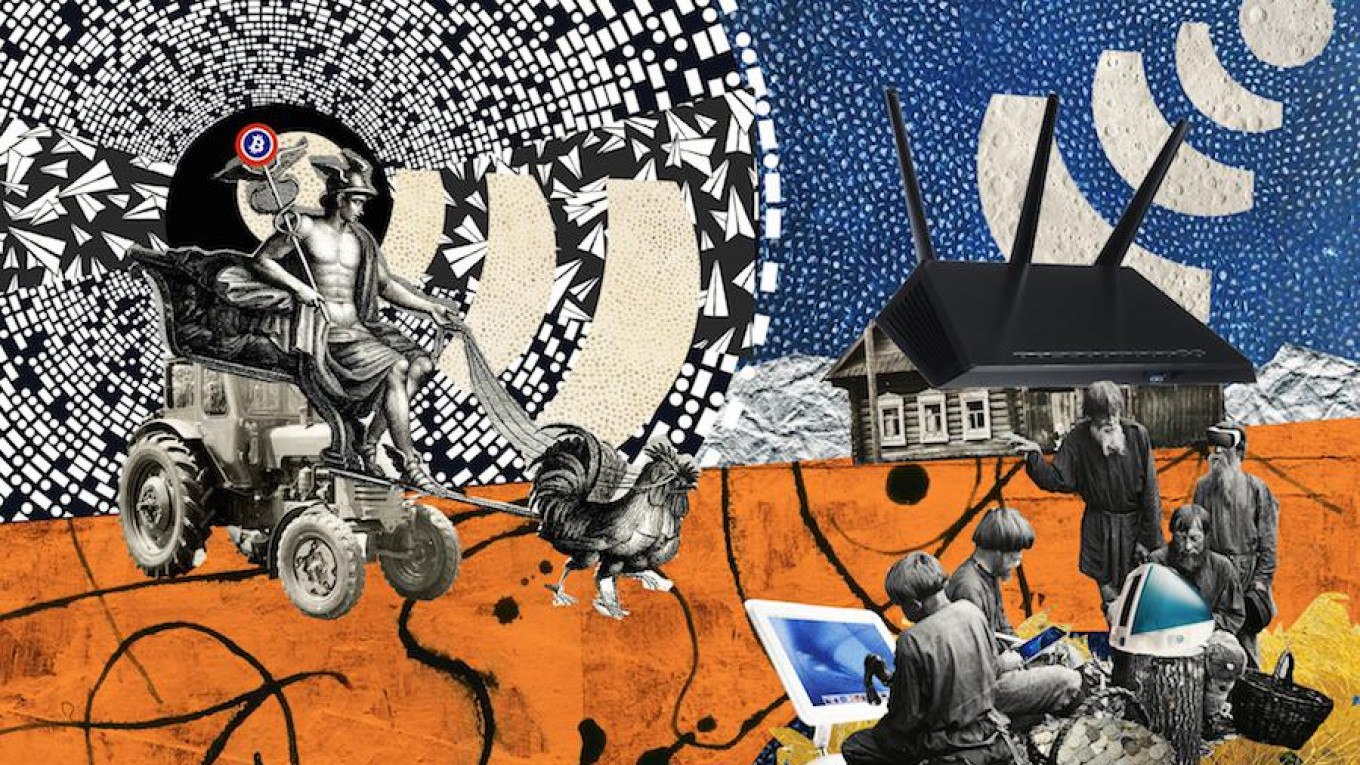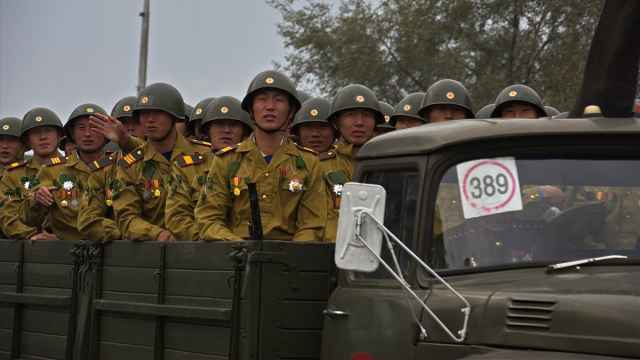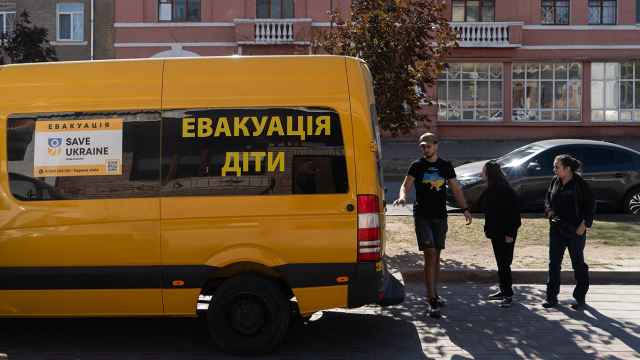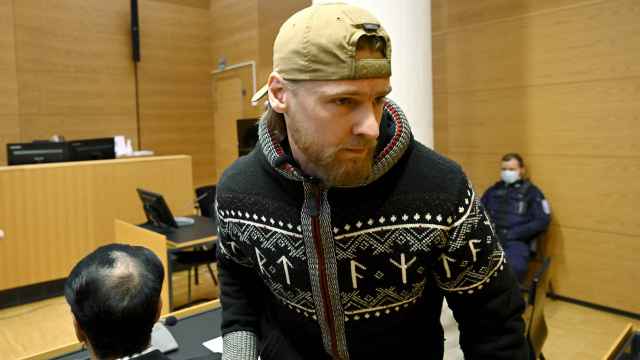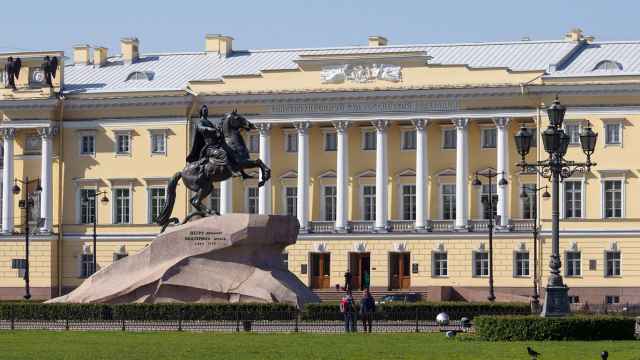Farmer Mikhail Shlyapnikov says creating his own virtual currency allowed him to raise almost $2 million in two months. The currency, the kolion, is named after the Moscow region village of Kolionovo, where Shlyapnikov lives. During its April launch period, investors from around the world bought $500,000 worth of the currency. Since trading began at the beginning of May, one kolion has almost doubled in price to be worth just under $2.
Shlyapnikov says that buyers of his agricultural produce are now looking to acquire kolions—gambling the currency will continue to strengthen.
“I have a new instrument,” he says. “It’s like getting a tractor.”
Shlyapnikov’s kolion project is a rare case of cryptocurrencies—of which bitcoin is the most famous—underwriting real-life ventures. Up until now, their use has been mostly restricted to online projects. But experts say examples like that of Shlyapnikov will become more common as the popularity of cryptocurrencies grows at break-neck speed.
And expansion in Russia is likely to be fueled further by a change in rhetoric from officials. Just last week, President Vladimir Putin made the development of the “digital economy” a centerpiece of his keynote speech to the St. Petersburg International Economic Forum.
“It’s an international trend and we are only at the beginning of this journey,” says Shlyapnikov.
Make bitcoin not war
Cryptocurrencies are built on a technology called blockchain, a decentralized database for recording financial transactions and other types of deals. Blockchain was developed for bitcoin, the value of which soared past $2,800 this week (almost five times more than this time in 2016).
“Over the last year, blockchain technology entered the real world,” says Pavel Novikov, the director of financial technology at Skolkovo, the Russian tech hub.
Many companies that use blockchain raise money by selling digital coupons that can then be used to buy goods and services on their platform or saved as an investment.
Such “Initial Coin Offerings,” or ICOs, are increasingly popular. For example, a group of entrepreneurs and scientists is currently pushing the sale of a new virtual currency called ZrCoin. The proceeds of the ICO will be put towards building a factory in the Russian city of Magnitogorsk that will produce zirconium dioxide, a chemical used for making heat-resistant alloys.
ZrCoin, whose ICO ends Friday, has already proved a success, collecting over $5.6 million.
Shlyapnikov points out that those who organize ICOs do not have to be technical experts.
“I don’t understand how blockchain works, I don’t understand how the internet works, I don’t understand how internal combustion engines work, I don’t understand how mobile phones work—but I use all of them,” he says.
The success of ICOs has generated greater interest in bitcoin and other cryptocurrencies, which are relatively difficult to transfer into traditional assets. Pavel Vrublevsky, head of Russian payments firm Chronopay, says that he only recently realized the potential of cryptocurrencies. Chronopay announced earlier this month that it would accept payments in bitcoin from all of its clients, which include Russian telecoms giant MTS and charities like Greenpeace.
“As soon as I saw that people were raising real money in ICOs I got interested,” says Vrublevsky. “Make bitcoin not war.”
“Cryptocurrencies were always popular in Russia”
Russia’s competitive advantage
The use of blockchain is spreading rapidly in most countries, but some believe it has a particularly bright future in Russia. Technical and mathematical education standards in the Soviet Union were some of the highest in the world, and this tradition has persisted in modern Russia. Despite declining standards, the country still produces some of the world’s leading mathematicians.
The founder of Ethereum, the second most popular cryptocurrency in the world after bitcoin, is Russian-born Vitalik Buterin, 23. The world’s largest bitcoin manufacturer, or “miner,” Bitfury, was created by Valery Vavilov, 37, who was born in then-Soviet Latvia.
“Cryptocurrencies were always popular in Russia,” says Skolkovo’s Novikov. “Russian-language developers are the most visible among developers working with blockchain technology.”
Marina Guryeva, the founder of several blockchain projects, says that Russia and other former Soviet Union countries are drivers of blockchain growth. The trend is driven, she says, by high technical education standards, a lack of heavy-handed regulation and the attractiveness of an investment opportunity not tied to a volatile ruble or low-interest deposit accounts.
Additionally, cryptocurrencies can give access to investment to many Russian businesses ineligible for state support or unable to afford the high-interest loans on offer from domestic banks.
One of Guryeva’s projects, Golos, is a Russian-language social network built on blockchain technology. She says its success is driven by the sense of ownership enjoyed by its members as much as a desire for profit. Golos currently has over 40,000 users and its own cryptocurrency system that means you can earn money for posting well-received material and being an active member of the community.
“The value [of the currency] correlates to the number of users and the popularity of the network,” she says. “Everyone can feel like they are an owner of what takes place on the platform, and everyone has the opportunity to influence how the platform develops.”
Official re-think
A dramatic shift in the rhetoric used by top Russian officials about cryptocurrencies and blockchain assets in recent months has given a boost to the fledgling industry. In little under a year, officials have gone from proposing that cryptocurrencies should be banned and their users imprisoned, to suggesting legalization is on the cards.
On June 2, Putin told delegates of the St. Petersburg International Economic Forum that the digital economy was “the foundation that will facilitate the creation of a new business model.” Deputy Prime Minister Igor Shuvalov reiterated the message, telling journalists Putin had “come down with a bout of the digital economy flu.” He said the president had kept advisors close up until well after midnight one evening to discuss the issue.
Putin even met with Ethereum founder Buterin during the forum. Ethereum raised $18 million during its ICO and its currency is currently trading at $256 —18 times more than this time last year.
Russia’s Central Bank has been more cautious about cryptocurrencies, but its head Elvira Nabiullina told U.S. television network NBC last week she was “analyzing the possibility” of legalization.
Her deputy, Olga Skorobogatova, who oversees cryptocurrencies, announced at the St. Petersburg forum that the Central Bank was considering launching its own cryptocurrency. Top officials have also reportedly said that discussions are underway to allow the trading of cryptocurrencies on major Russian stock exchanges.
Some see the change of attitudes as a result of the work of influential figures close to Putin known to be in favor of cryptocurrencies. German Gref, the head of Russia’s largest bank, state-owned Sberbank, has publicly called for the legalization of bitcoin and a coffee shop at Sberbank’s Moscow headquarters reportedly accepts payment in the virtual currency. Boris Titov, the Kremlin’s business ombudsman, and Alexei Kudrin, a former finance minister, have also spoken out against banning cryptocurrencies.
“We have crypto-adepts in high places,” says Vladimir Smerkis, the co-founder of the Token Fund, a blockchain based investment vehicle for investing in digital assets.
“We have crypto-adepts in high places”
Real-life limits
While ICOs are happening with increasing frequency, levels of knowledge about cryptocurrencies are very low.
“There are between 10,000 and 20,000 people who more or less know about cryptocurrencies in Russia,” says Smerkis. “And when the economy is very small, the volatility is very high.”
Some of the attempts to integrate bitcoin into Russia’s everyday financial infrastructure have met with failure. The country’s first bitcoin exchange point opened on central Moscow’s New Arbat Street last year, but shut-down with - in four months because of a lack of demand. The exchange charged customers 4 percent commission during the day and 10 percent commission at night to convert bitcoin into rubles.
“People are scared and would prefer to work online,” says a representative of the now-defunct exchange office, who declined to give his name because of fears about the legality of the operation. The representative added that he would be ready to open another such exchange point if regulatory conditions improved.
“If there are a green light and new laws then maybe we will try to open one again,” he says. “Cryptocurrencies are becoming mainstream.”
A representative of another bitcoin exchange point in Moscow that opened last year —and was reported as the country’s second such outlet —did not respond to repeated calls from The Moscow Times.
Bubble fears
Cryptocurrency critics suggest that strong demand is in dan - ger of overheating the market and warn of a possible crash. According to Skolkovo’s Novikov, interest in ICOs is “inflating too quickly.”
“At the moment it’s a pure bubble,” says Chronopay’s Vrublevsky. “But when they are able to use cryptocurrencies to invest in the real economy, [things] will have reached the next stage.”
Nearly $250 million has been put into ICOs across the world, according to Smith+Crown, a cryptocurrency research firm. Most of this sum, $107 million, was raised in 2017.
While the value of most leading cryptocurrencies has risen through their trading life spans, the increase has also been accompanied by occasional sharp price falls and violent volatility on exchanges.
Russian Central Bank Governor Nabiullina has warned of the “many risks” of using bitcoin. Many ordinary Russians still remember the substantial losses they incurred from feverish investment in pyramid schemes that flourished in the 1990s
Naibullina’s point is taken up by Novikov, who suggests that any rapid move towards legalization of crypto-currencies in Russia could spark even more interest in ICOs and stoke a buying frenzy.
There will be “sad consequences,” if that happens, he says: “It would be like taking someone with a temperature to the sauna.”
A Message from The Moscow Times:
Dear readers,
We are facing unprecedented challenges. Russia's Prosecutor General's Office has designated The Moscow Times as an "undesirable" organization, criminalizing our work and putting our staff at risk of prosecution. This follows our earlier unjust labeling as a "foreign agent."
These actions are direct attempts to silence independent journalism in Russia. The authorities claim our work "discredits the decisions of the Russian leadership." We see things differently: we strive to provide accurate, unbiased reporting on Russia.
We, the journalists of The Moscow Times, refuse to be silenced. But to continue our work, we need your help.
Your support, no matter how small, makes a world of difference. If you can, please support us monthly starting from just $2. It's quick to set up, and every contribution makes a significant impact.
By supporting The Moscow Times, you're defending open, independent journalism in the face of repression. Thank you for standing with us.
Remind me later.



